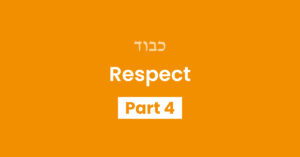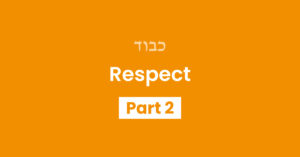We have been focusing this month on the middah of kavod – treating other people with respect and honor. Last week, we explained that when we recognize the greatness in another person, we are required to treat them with honor. The more we recognize the specific ways in which our friends and neighbors are special and greater than us, the more we will treat them with the honor they deserve.
Earlier, we also explained that the word “kavod” (כבוד) comes from the same root as “kaveid” (כבד) which means “heavy.” When we treat people with honor, we show that they matter. They are “heavy” to us; they “carry weight” and are significant in our eyes.
This week, let’s take a look at one particularly powerful way to give kavod to other people and help them feel that they matter.
The Power of a Smile
Although we all strive to be nice people, the Gemara1 tells us that Rabbi Yochanan ben Zakkai was exceptionally nice in one area: Rabbi Yochanan was always the first to greet other people and say “Hello.” No one was ever able able to “beat” him in the “race” of saying hello; he was always the first to extend a greeting.
Why does the Gemara tell us this fact about Rabbi Yochanan? Why was it so special?
One answer is that the Gemara is trying to teach us the importance ofacknowledging another person. When we make a point to notice another person and acknowledge their presence, it shows that they are significant in our eyes. When you notice someone walk into a room and you say hello, essentially you are saying: “I noticed you, and you are worthy of my attention, because you matter!“
When we make a point to notice another person and acknowledge their presence, it shows that they are significant in our eyes.
By contrast, we all know how painful it is to feel is ignored. When you walk into a room and no one comes over to say hello, how do you feel? You probably feel like a mere shadow of yourself, or like you don’t exist at all.
You are probably familiar with what is sometimes called “The Hello Game.” You see someone at a wedding, or while standing in an elevator, and suddenly a competition begins: Who is going to say hello first? You shift uncomfortably and try to avoid making eye contact, or maybe you stare at your phone. You wonder: Does he notice that I’m here? Is he going to say hello? Or is he waiting for me to say hello first?
What’s going on? Why do we play this ridiculous game? Why don’t we just go over and say hello first?
As Rav Chaim Dov Stark2 explains, the “hello game” is all just a question of who values the other person more? Does he value my presence enough to notice me, and come over to say hello? Or should I “lower myself” and be the first to break the ice – indicating that I value him more than he values me?
Who values the other person more?
The reason why this “game” is so absurd is because every single Jew has tremendous value, and is loved by Hashem. There is no way to measure one Jew’s valuable compared to the next. Every person plays an essential role in Hashem’s master plan for the universe, and has the power to affect the spiritual and physical state of this world through his mitzvos and aveiros. We have no idea how much greatness is achieved by every person.
This is especially true considering what the Gemara3 says: When Rav Yosef’s soul entered the Next World, he saw an upside-down world. People who seemed to be great down here, were actually much lower in the Next World. And people who seemed to be lowly in this world, were actually much greater in the Next World.
When we make sure that we are the first ones to say hello, it’s a powerful way to show our friends – and remind ourselves, too – that every single person matters and has value.
The Neshama Needs to Feel Valued
Being the first to say hello is not just something that Rabbi Yochanan did. It’s actually a requirement that is incumbent upon all of us, as the Gemara writes4: “If your friend is coming toward you and you know he is likely to say hello, you should make a point to greet him first.”
When we greet other people with a smiling face and an enthusiastic hello, it shows that we value them. This feeling of “I matter” is so essential to every person’s sense of wellbeing.
This feeling of “I matter” is so essential to every person’s sense of wellbeing.
As the Meforshim explain5 the Neshama (soul) is called “Kavod” (honor). Why? Because a person’s soul is what gives them value. Without the Neshama, every person would be just a clump of dirt held together with some bones. But the presence of the Neshama is what elevates that clump of dirt into a human being. The Neshama is what gives a person value. It’s what gives us life.
When you greet another person, you are essentially tapping into their Neshama and noticing its value.That’s why a person’s face lights up when you give them an enthusiastic greeting. They feel that you are noticing their Neshama. We all need to feel valued in order to continue to exist and invest meaning into our lives. You can shape someone’s entire reality and self-perception and self-value simply by greeting them with a big smile.
This is the meaning of the Gemara6 which says: “It is better to ‘whiten your teeth’ (i.e. to smile at someone and show them your white teeth) than to give him [white] milk.” If you give someone milk, you are giving them physical sustenance. But if you give someone a smile, you are giving them life. You are infusing their Neshama with value and recognition, which makes them feel “real.”
This week, let’s practice showing Kavod to other people by greeting them with a smile. By making an effort to greet other people first, we will be showing them – and reminding ourselves – that every single person has tremendous value and is deserving of honor.
Sources: [1] Brachos 17a; [2] Kavod (Part 2): The Health of Recognition by Rabbi Chaim Dov Stark; [3] Pesachim 50a; [4] Brachos 6b, also see Pirkei Avos 4:15; [5] Metzudas Tziyon on Tehillim 57:9; [6] Kesubos 111b;
Your Challenge
Once a day, smile or greet another person BEFORE they greet you. Be the first one to extend a greeting.
As you greet them, try to think: “This person is valuable!”
Torah Questions
- What comparison does it say in Mishlei 27:19 to describe how any two people tend to feel about each other?
- In Pirkei Avos 2:10,Rabbi Eliezer said: “Make sure that your friend’s honor is just as precious to you as your own honor, and ________?”
- Someone once came to Hillel and asked him to teach him the entire Torah on one foot. Hillel responded with one sentence: “What is __?__ to you, do not do to your friend.” (Shabbos 31a)
- What kal vechomer does Rashi say in Shemos 2:22 to make the point that we must treat our friends with respect?
- The Midrash says that a person should honor his friend as much as he fears his Rebbe. The Midrash learns this rule from a certain man who called his younger brother “my master” even though this brother was younger. Which person called his younger brother “my master”? (See Bamidbar 12:11)
- The Gemara (Brachos 28b) says that when a certain Tanna was sick, his students came to visit him and asked for advice for how to merit life in the World to Come. He gave them several pieces of advice, including: “Be careful to treat your friends with respect.” Which Tanna was it?
Questions to Ponder
- Pirkei Avos teaches us: “Honor your students as much as you honor yourself, and honor your friends as much as you fear your Rebbe, and fear your Rebbe as much as you fear Heaven.” Why does the Mishna encourage us to take an extra step in each aspect? Why wouldn’t it be enough to just honor your students and friends as much as they deserve to be honored, and fear your Rebbe as much as your Rebbe deserved to be feared? What is the Mishna trying to teach us?
- The Gemara says that if someone says hello to you, and you do not respond with a greeting of your own, you are called a robber because you “stole” his greeting without giving anything back. Do you think this sounds extreme? What is the Gemara trying to teach us?
- It says in Pirkei Avos 2:11: “Ayin Hara (the Evil Eye), the Yetzer Hara, and Sinas HaBriyos (hatred of Hashem’s creations) remove a person from this world.” But a different Mishna in Pirkei Avos (4:21) says that jealousy, lust, and pursuit of honor are the 3 things that remove a person from this world. Is there a contradiction between these two Mishnayos? How might it be resolved?




